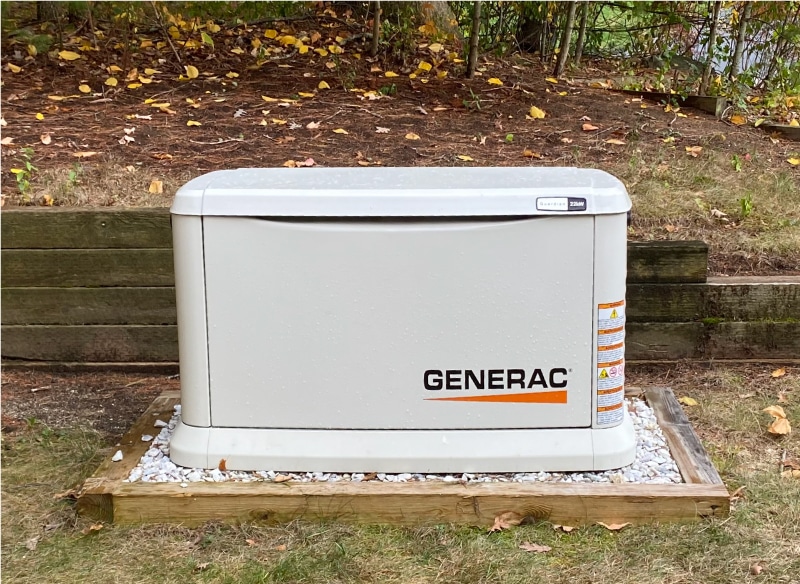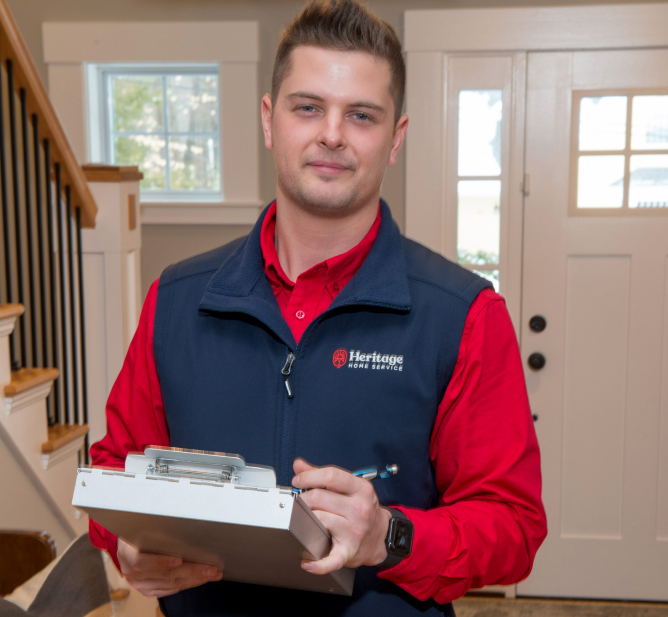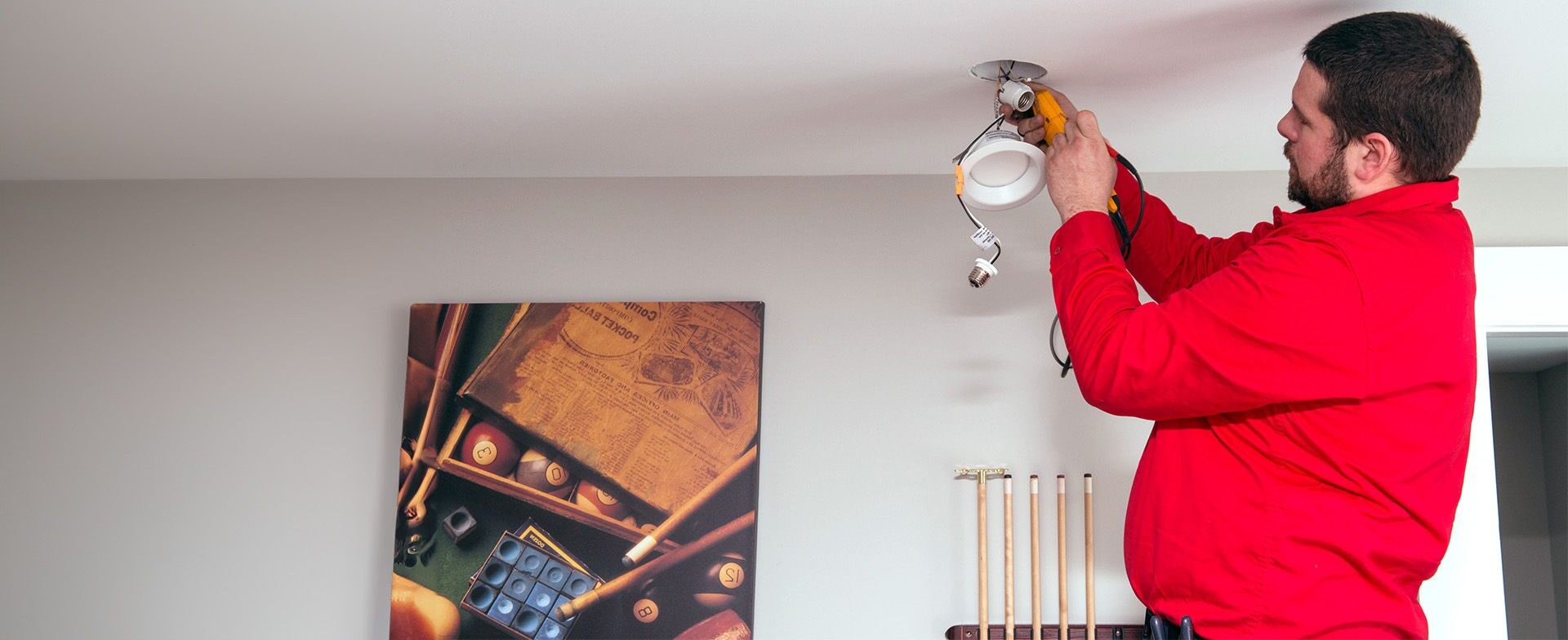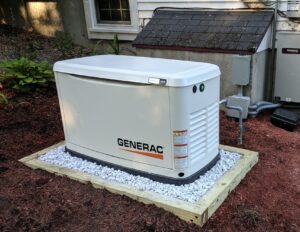
In Maine, a state known for its rich history and vibrant seasons, Heritage Home Service offers a steadfast solution for residents contemplating the installation of whole-home generators. Drawing upon over 35 years of excellence in electrical services and a strategic alliance with Generac, we provide homeowners with superior products and a full suite of services encompassing installation, maintenance, and repair.
This dedication reflects a deep understanding of Maine’s unique weather patterns and the need for reliable power to safeguard homes against the unpredictable. With a team of expert, licensed electricians, Heritage Home Service prioritizes Maine homes’ safety, comfort, and continuity, ensuring you remain powered through every season’s challenges.
FAQs
-
Which Generator is Right for Your Maine Home?
Here at Heritage, we understand that power outages can be more than just an inconvenience – they can disrupt your life. That’s why we offer comprehensive whole home generator solutions tailored to your needs. We have you covered from portable generators, ideal for keeping essential devices running, to our fully automated standby generators that ensure your home remains powered during outages. Our team is ready to guide you through choosing the right system, providing a seamless professional installation for peace of mind during those unpredictable Maine storms.
-
Heritage is Your Official Generac Dealer in Maine
As an official Generac generator dealer, Heritage can offer the best in whole-home generator technology. Generac’s reputation for quality and reliability makes it a top choice for Maine homeowners who demand the best backup power. With a Generac unit at your home, you’ll never have to worry about power again. Generac will keep your power running through the worst conditions imaginable.
In addition to standby generators, Heritage offers a variety of Generac products including portable generators, transfer switches, and more!
-
Do You Need a Whole Home Generator?
In Maine’s rugged and unpredictable climate, where storms can leave residents without power for days, more than portable generators or battery backups might be required, especially for homes requiring continuous power for medical devices or overall well-being.
A whole-home standby generator, capable of connecting to an existing natural gas line or propane tanks, offers a robust solution. It powers your home effortlessly and automatically, ensuring you and your family stay comfortable and safe, even during extended outages.
-
What Fuels Can Generators Use?
For Generac’s generator installations, the options are narrowed down to natural gas or liquid propane, allowing for customization according to the availability and preferences at the installation site. This choice is vital for maintaining a reliable power source during outages. It’s recognized that gasoline, diesel, propane, and natural gas are the primary fuels for generators, each affecting how long and efficiently a generator operates. The type of fuel impacts the generator’s runtime and factors into considerations like storage, cost, and environmental impact.
-
How Often Does a Whole Home Generator Need Maintenance?
Just because your generator sits quietly for most of the year doesn’t mean it can skip its annual check-up. Think of it as an athlete in training, constantly gearing up in the background, ready to sprint into action the moment a power outage hits. This low-profile workhorse must undergo test runs throughout the year, ensuring it’s in tip-top shape and skipping its yearly inspection. These check-ups aren’t just fluff; they’re essential for spotting potential issues early on, swapping out any parts teetering on the edge of failure, and ensuring it lives a long and productive life.
Partnering with Cote Electric for Expert Generator Installation
At Heritage Home Service, we’re committed to keeping your home powered and protected. That’s why we’ve partnered with Cote Electric, a trusted local expert in whole-home generator installation and service. This collaboration allows us to provide faster scheduling, expert guidance, and reliable backup power solutions across New Hampshire and Massachusetts.
Our Whole Home Generator Services in Maine
At Heritage Home Service, we’re excited to offer Maine whole-home generator solutions from our team of experts. At the forefront of our service offerings is Generac, renowned for setting the benchmark in generator performance and dependability.
Our expertise, however, spans a wide range of residential generators, including those from Kohler to Briggs and Stratton. Whether you’re in the market for a new generator installation, need routine upkeep, or require urgent repairs, we’re your go-to team in Maine, ensuring you’re always prepared, no matter what mother nature throws your way.
Schedule Whole Home Generator Installation Today for Peace of Mind
Heritage Home Service is committed to keeping Maine’s homes powered, comfortable, and safe. With our home generator installation services, you’re not just installing a piece of equipment; you’re ensuring that your home remains powered through every season and storm.
Are you ready to safeguard your home with a reliable power source? Contact Heritage Home Service today for a free consultation on whole-home generator installation. Let’s keep your Maine home powered – no matter what.


Financing Made Easy
When you choose Heritage, you can rest easy knowing that we provide straightforward options to help you budget for a complete solution that will last you for decades to come.
VIEW FINANCING OPTIONS
Complete Care Plan
With Complete Care, enjoy peace of mind knowing your home’s plumbing, heating, cooling, and electrical needs are handled year after year—hassle-free, with added benefits.
VIEW PLANWhat Our Customers Are Saying
Schedule a comprehensive service near you!
Whether you need routine maintenance, repair, or new installation – we have you covered.
Find a Service Technician Near You
-
Belknap County, NH
- Alton
- Barnstead
- Belmont
- Gilford
- Gilmanton
- Laconia
- Meredith
- New Hampton
- Sanbornton
- Tilton
-
Hillsborough County, NH
-
Merrimack County, NH
-
Rockingham County, NH
- Atkinson
- Auburn
- Brentwood
- Candia
- Chester
- Danville
- Deerfield
- Derry
- East Kingston
- Epping
- Exeter
- Fremont
- Greenland
- Hampstead
- Hampton
- Hampton Falls
- Kensington
- Kingston
- Londonderry
- Newfields
- Newington
- Newmarket
- Newton
- North Hampton
- Northwood
- Nottingham
- Plaistow
- Portsmouth
- Raymond
- Rye
- Salem
- Sandown
- Seabrook
- South Hampton
- Stratham
- Windham
-
Strafford County, NH
- Barrington
- Dover
- Durham
- Farmington
- Lee
- Madbury
- New Durham
- Rochester
- Rollinsford
- Somersworth
- Strafford
-
Cumberland County, ME
-
York County, ME













